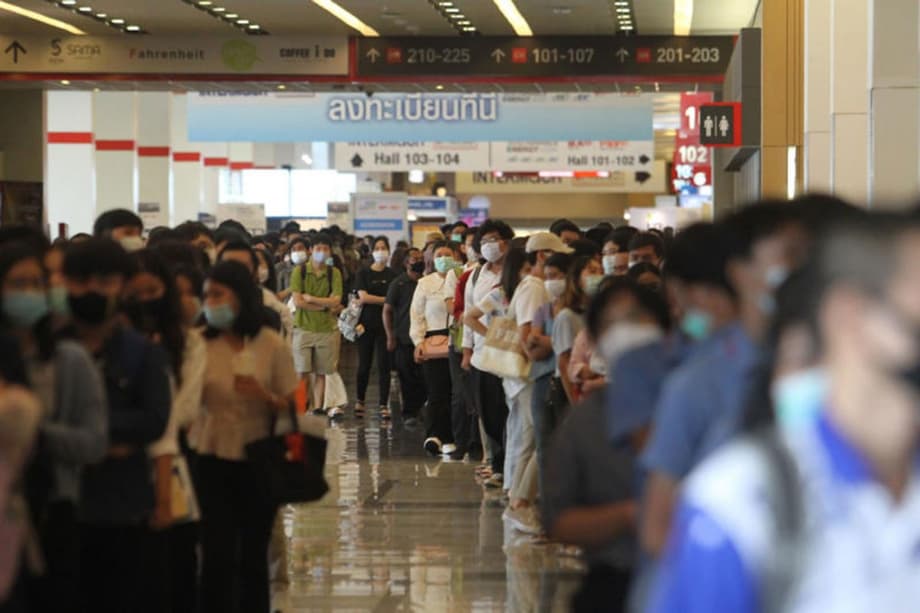A generation choosing flexibility over corporate careers
Thailand is undergoing a shift in how young people approach work. Many new graduates are less interested in full time corporate roles, especially in factories, and are looking for flexibility, freelance income, and self directed careers. Employers, meanwhile, are slower to hire first time applicants. Companies cite weak practical skills, limited workplace experience, and a need to control costs in an uncertain economy. The push and pull is reshaping the job market just as trade tensions, automation, and rising business closures put pressure on hiring.
- A generation choosing flexibility over corporate careers
- What the data shows about unemployment and underemployment
- Why employers hesitate and why many graduates choose independence
- Tariffs, weak exports, and SME stress ripple through jobs
- Technology is both headwind and engine of new jobs
- Where opportunities are still growing
- How universities and training providers are adapting
- Policy moves that could ease the crunch
- What Thai workers can do now
- The Bottom Line
Each year, Thai universities and colleges turn out roughly 450,000 new graduates, about 61 percent with bachelor degrees. Yet a growing share of degree holders struggle to land their first job. The National Economic and Social Development Council (NESDC) has warned that 89 percent of executives avoid hiring fresh graduates. That reluctance has intensified in 2025 as companies trim openings, shift toward temporary contracts, and reduce intake for roles that require training. Many graduates, in response, are trying freelancing, gig work, content creation, or small online businesses, seeking work that fits their schedules and location preferences.
The trend does not stand apart from global shifts. Firms around the world are reducing headcount, reworking job descriptions to include AI tools, and consolidating white collar roles. Thailand’s labor market is also unique in its mix of formal and informal employment, which helps keep reported unemployment low but masks underemployment and unstable incomes. Beneath the headline numbers, several segments are under strain, especially young job seekers and those with degrees who lack practical experience.
What the data shows about unemployment and underemployment
Thailand’s official jobless rate fell back to roughly 1 percent in 2023 and early 2025 after peaking during the pandemic, but that picture is incomplete. Employment tied to the social security system shows rising stress. The unemployment rate among workers under social security climbed to 2.3 percent in July 2025, the highest in three years. Youth unemployment for ages 15 to 24 climbed to 5.9 percent in the second quarter of 2025, the highest since 2023. Among bachelor degree holders and above, unemployment rose to 18.9 percent in the same quarter, up sharply from the previous period.
The number of people counted as employed has also slipped. Total employment is down by more than 500,000 compared with 2023, the year the labor market peaked at around 40 million jobs after the pandemic rebound. Underemployment has increased in trade and services. Average weekly hours worked ticked up, but that partly reflects people stringing together more shifts to make ends meet rather than an expansion in quality roles. Thailand’s low official unemployment rate reflects the structure of its labor market, which has a large informal segment and seasonal agricultural cycles. That dynamic can understate slack and does not fully capture the experience of graduates and urban workers whose skills are mismatched with available jobs.
Why employers hesitate and why many graduates choose independence
Employers consistently say they want work readiness. Surveys in 2025 show a strong preference for hires with experience and a reluctance to train for basic workplace norms. New graduates report a paradox: companies require experience for most roles, yet entry routes to gain that experience have narrowed, especially paid internships.
A mismatch in skills and experience
A study of more than 221,000 job postings found that only about one fifth were suitable for beginners, while most required one to two years of experience. Employers across sectors repeatedly highlight four skills above others: English proficiency, problem solving, communication, and sales acumen. Technical skills in areas such as data, cloud, and cybersecurity are in demand, but companies still want applicants who can operate in teams, handle clients, and adapt to change. The Asia Foundation’s research on Thailand’s developer community points to persistent gaps in advanced programming, cloud, and cybersecurity, as well as limited access to high quality training and mentorship outside major urban centers.
Lifestyle priorities and the gig economy
Many graduates say flexibility matters as much as pay. Remote work made during the pandemic changed expectations. Project based work, digital content, and e commerce offer control over time and place. Younger workers often prefer to build portfolios rather than commit to rigid schedules in roles that pay modest entry salaries. Social media, online marketplaces, and contract platforms make freelancing visible and accessible. That said, freelance income can be unstable and often lacks social protection, a significant concern in an economy where informal work already dominates many sectors.
AI and corporate restructuring reshape demand
Technology is changing how companies staff teams. Firms are adopting AI to automate repetitive tasks in marketing, back office, and operations. Large Thai employers, including banks, are offering early retirement schemes starting at age 45 in part to reorganize around AI and digital tools. The NESDC has noted a shift away from permanent roles toward contract and part time arrangements. Global research also shows rising unemployment rates among certain majors exposed to AI. Growth in tech subsectors like cloud and computer systems design slowed after late 2022 as firms rebalanced headcount and integrated large language models into workflows. For graduates, that translates into fewer first jobs in traditional pipelines and more demand for hybrid roles that blend technical literacy with client or product responsibility.
Tariffs, weak exports, and SME stress ripple through jobs
External shocks are amplifying domestic pressures. The Economic Intelligence Center of Siam Commercial Bank estimates that roughly 5 million Thai workers, about 12 percent of the labor force, face risk of job losses or fewer hours from direct and indirect impacts of U.S. tariffs on Thai exports. The vulnerable group is concentrated in rubber, textiles, tyres, auto parts, electronic components, consumer electronics, and hard disk drives. When exports slow, suppliers cut overtime first, then shift workers to shorter schedules, and in some cases reduce headcount. The effects tend to show up with a lag in official employment data.
Small and medium sized enterprises, the backbone of Thai employment, are struggling more than large firms. NESDC reporting points to more than 24,000 SME closures and 1,234 factory shutdowns in recent periods, a blow to job creation. Company deregistrations rose, with thousands of firms closing between January and July 2025. Tourism has rebounded, yet hotel and restaurant employment still slipped for temporary staff as operators kept costs tight. That environment makes firms cautious about onboarding inexperienced graduates, especially in roles where training costs are high and demand is uneven month to month.
Technology is both headwind and engine of new jobs
AI reduces the need for people in some tasks but it also raises productivity and opens new work. In marketing, AI now handles basic copywriting, audience segmentation, and campaign optimization, reducing the number of junior hires while boosting expectations for strategy and client work. In software, junior developers can build more with AI tools, which reduces demand for some senior roles focused on coding and increases demand for reviewers, architects, and product owners who can frame problems and verify outputs. In banking and corporate back offices, automation of routine workflows is quickening, spurring early retirement offers and team redesigns.
Global research points to a mild negative relationship between AI usage and job growth in certain white collar sectors, especially those heavy on non routine cognitive work. That does not mean mass unemployment. It does mean that the timing and mix of roles are changing, with longer recoveries for affected occupations during downturns. On the upside, industries that adopt AI well tend to see faster productivity gains, new products, and higher wage potential for workers who can integrate these tools. Thailand’s challenge is to build that capability at scale while protecting workers who face disruption.
Where opportunities are still growing
Despite the headwinds, several sectors are expanding and need people with the right mix of technical and soft skills. Demand is strongest where digital tools, aging demographics, and industrial upgrades overlap with policy support.
- Digital technology and cybersecurity: Software and digital services are growing at a fast clip, supported by government incentives and investment by global cloud companies. Cybersecurity spending in Thailand is expected to reach roughly 18.4 billion baht in 2025. Employers seek AI literacy, cloud skills, cyber defense, and data analytics, along with communication and client management.
- Semiconductors, electric vehicles, and advanced manufacturing: Policy drives for EVs and electronics, combined with supply chain diversification, are creating roles in factory automation, quality engineering, and supplier management. Knowledge of sensors, power electronics, and production software is valuable.
- Tourism and hospitality: As international travel stabilizes, airlines, hotels, and travel services are rebuilding teams. Customer service and digital marketing skills help candidates stand out. Hotels still require human hospitality at the front office, while AI increasingly supports back office analysis and marketing.
- Healthcare and elder services: Thailand’s aging society is pushing demand for nurses, physiotherapists, fitness trainers, and elderly care specialists. Employers value empathy, safety protocols, and digital record keeping.
- Green jobs and sustainability: Universities have integrated sustainability into curricula, and employers are looking for graduates who can work on waste management, energy efficiency, and compliance. Project experience through community programs boosts employability.
- Finance and compliance: Accounting, auditing, risk, and data heavy roles remain active as companies navigate new regulations and digital transformation. Skills in analytics and process improvement help graduates move beyond clerical work.
Hiring for these fields depends on a better match between training and workplace needs. Thailand faces a shortage of advanced digital talent, with only a small share of the population possessing higher level digital skills and only a few thousand IT graduates each year relative to demand. That gap is encouraging alternative training providers, including intensive bootcamps with job placement services, to scale up.
How universities and training providers are adapting
Thailand’s Ministry of Higher Education, Science and Innovation has steered universities to integrate United Nations Sustainable Development Goals into teaching and community work. A national survey of students across 94 institutions found that most gained sustainability related experience through placements and internships. A large majority felt more confident about employability after graduation, and many expressed interest in careers related to sustainability or entrepreneurship. Programs like the University to Tambon initiative give students hands on projects in local communities, helping them build portfolios that employers can evaluate.
At the same time, research on the developer ecosystem highlights divides in training access between urban and rural regions, gaps in advanced programming and cloud skills, and the need for stronger mentorship. Leading Thai universities have expanded programs in AI, data science, cybersecurity, and digital business, often in partnership with industry. These collaborations can expose students to real projects and internships. Intensive training programs and coding bootcamps promise fast skill building and often include coaching, employer networks, and job guarantees. These programs are appealing to graduates who want practical experience and faster entry into high demand roles.
What employers say they want
Employers repeatedly list a familiar set of attributes: solid English, clear communication, problem solving, teamwork, and basic business etiquette. For tech, they add cloud platforms, databases, AI prompting, and cybersecurity fundamentals. For finance, they add spreadsheets, data visualization, and compliance literacy. For hospitality and retail, they ask for customer care, service recovery, and digital tools for reservations, inventory, or marketing. Beyond technical knowledge, they value learning agility and a pattern of finishing projects on time.
Practical pathways to first jobs
Students can improve their chances with a few concrete steps. Choose courses with a work placement. Build a portfolio of projects, case studies, or code repositories. Take part in competitions and hackathons that mimic real client problems. Seek micro credentials for specific tools used in target industries. Use industry meetups, alumni groups, and local conferences to build connections. When possible, accept short contracts that offer exposure to professional workflows. These activities are valuable signals when most postings prefer experience.
Policy moves that could ease the crunch
Several policy steps could help match graduates to jobs and make the labor market more resilient during the next downturn. Work integrated learning should expand, with tax incentives for employers who provide structured apprenticeships and first jobs for graduates. Targeted skill vouchers and portable learning accounts could support short, stackable courses that align with industry demand. Public job platforms can highlight beginner friendly roles and standardize internship quality.
SME digital transformation needs deeper support. Grants or co investment for software, cybersecurity, and AI proof of concept projects can raise productivity and create new roles. Export facing firms in high risk sectors such as rubber, textiles, and electronics need help with market diversification and compliance upgrades. Social protection should adapt to cover freelancers and dependent contractors, ensuring access to insurance, training, and credit. Universities and employers can formalize credit for industry projects, so graduates graduate with evidence of practical work, not only transcripts. Finally, better labor market data on underemployment and informal work would let policymakers target interventions more precisely.
What Thai workers can do now
Graduates and mid career workers can hedge against unpredictability by combining capability building with practical exposure. The following steps are achievable without waiting for policy change.
- Build a portfolio that proves skills, not only a resume. Show your work with links, code, case summaries, or design samples.
- Raise English and digital fluency. These open doors across sectors and allow collaboration with multinational teams.
- Learn to work with AI tools. Treat them as assistants, not replacements. Practice prompting, verification, and error checking.
- Target growing sectors and roles where your background has an edge. Look for adjacent roles if the first choice is crowded.
- Seek internships, apprenticeships, and project based contracts that offer feedback from professional mentors.
- Strengthen soft skills, especially communication, presentation, and client handling. These often decide who gets promoted.
- Consider intensive training programs if they include employer networks, career coaching, and clear placement records.
- Protect your finances. Keep savings for transitions, and understand the benefits and risks of freelance contracts.
The Bottom Line
- Thai graduates are less interested in full time corporate roles, while employers are slower to hire first time applicants.
- Official unemployment is low, yet youth and degree holder joblessness rose in 2025, and total employment fell from its 2023 peak.
- NESDC data shows 89 percent of executives avoid hiring fresh graduates, citing lack of experience and weak soft skills.
- Tariffs on Thai exports and a slowdown in key industries put about 5 million workers at risk of job losses or fewer hours.
- SME and factory closures have increased, constraining job creation despite a recovery in tourism.
- AI is automating routine tasks, reducing some junior roles while raising demand for hybrid jobs that blend tech and client skills.
- Growth areas include cybersecurity, cloud, data, EVs, semiconductors, healthcare, hospitality, and green projects.
- Universities are adding sustainability and industry projects to curricula, and intensive training programs are filling skills gaps.
- Policy priorities include apprenticeships, skill vouchers, SME digital upgrades, and better social protection for freelancers.
- Workers can improve odds by building portfolios, raising English and digital fluency, and gaining practical experience through projects and placements.












